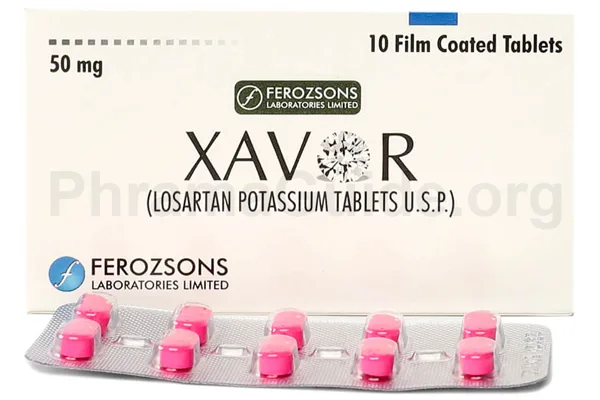Xavor is an angiotensin II receptor blocker (ARB) commonly prescribed to treat hypertension (high blood pressure) and other cardiovascular conditions. Like any medication, Xavor may cause side effects in some individuals. Here are some common and less common side effects of Xavor may include.
Common Side Effects
- Dizziness: Some people may experience dizziness with Xavor, especially when standing up quickly.
- Fatigue: Feeling tired or lethargic is a common side effect of Xavor.
- Hyperkalemia: Xavor can affect potassium levels in the body. In some cases, it may lead to elevated levels of potassium (hyperkalemia). This is more likely to occur in individuals with kidney problems.
- Cough: A persistent cough is a known side effect of some angiotensin-converting enzyme (ACE) inhibitors, but it can also occur with ARBs like Xavor.
- Hypotension (Low Blood Pressure): Xavor is designed to lower blood pressure, and in some cases, it may lower it too much, leading to hypotension.
- Changes in Kidney Function: Xavor affects the renin-angiotensin-aldosterone system, which can impact kidney function. This is generally more of a concern for individuals with pre-existing kidney conditions.
- Elevated Blood Urea Nitrogen (BUN) and Serum Creatinine: Xavor can sometimes lead to an increase in BUN and serum creatinine levels, indicating potential kidney function changes.
- Allergic Reactions: In rare cases, individuals may experience allergic reactions to Xavor, such as skin rash, itching, or swelling.
Less Common Side Effects
- Elevated Blood Sugar Levels: Some individuals may experience an increase in blood glucose levels while taking Xavor.
- Muscle Cramps or Weakness: In rare cases, Xavor may cause muscle-related symptoms such as cramps or weakness.
- Elevated Liver Enzymes: Xavor may lead to an increase in liver enzymes, although this is not common.
- Hypersensitivity Reactions: While rare, severe hypersensitivity reactions such as angioedema (swelling beneath the skin) or anaphylaxis (a severe allergic reaction) have been reported.
- Blood Disorders: There have been reports of changes in blood cell counts, including decreases in hemoglobin and hematocrit, although this is infrequent.
- Rhabdomyolysis: A very rare but serious side effect associated with Xavor is rhabdomyolysis, a condition involving the breakdown of muscle tissue. Symptoms may include muscle pain, weakness, and dark urine.
- Hyponatremia: Low sodium levels in the blood (hyponatremia) have been reported in rare instances while taking Xavor.

What is Xavor?
Xavor is one of the leading brands of Losartan Potassium, manufactured and marketed by Ferozsons Laboratories Ltd, Pakistan.
Xavor : Available Formulations and Strengths
Presently, Xavor is available in Tablet Form.
Xavor Tablet : 50mg strength
What Are The Possible Drug Interactions of Xavor?
- Potassium-Sparing Diuretics: Combining Xavor with potassium-sparing diuretics (e.g., spironolactone, triamterene, amiloride) or potassium supplements may increase the risk of hyperkalemia (elevated blood potassium levels).
- Non-Steroidal Anti-Inflammatory Drugs (NSAIDs): NSAIDs (e.g., ibuprofen, naproxen) may reduce the effectiveness of Xavor in lowering blood pressure. Additionally, there is an increased risk of kidney problems when combining NSAIDs with Xavor.
- Lithium: Lithium, used to treat bipolar disorder, can increase lithium levels in the blood. Combining lithium with Xavor may increase the risk of lithium toxicity.
- Antidiabetic Medications: Xavor may affect blood glucose levels. Combining it with antidiabetic medications (e.g., insulin, oral hypoglycemic agents) may require adjustments in the dosage of these medications.
- Aliskiren: Combining Xavor with aliskiren, another type of antihypertensive medication, is generally not recommended due to an increased risk of hypotension, hyperkalemia, and changes in kidney function.
- Certain Antifungal Agents: Azole antifungals (e.g., ketoconazole, itraconazole) may increase the blood levels of Xavor, potentially leading to an increased risk of side effects.
- CYP3A4 Inducers and Inhibitors: Drugs that induce or inhibit the activity of the CYP3A4 enzyme system may affect the metabolism of Xavor. Examples include rifampin (inducer) and ketoconazole (inhibitor).
- Other Antihypertensive Medications: Combining multiple antihypertensive medications, such as ACE inhibitors (Xavor), beta-blockers, or calcium channel blockers, may lead to additive effects on blood pressure.

Leave A Comment